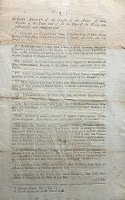 Tomorrow is New Year's Day! Well, at least, it would be here in the former English colonies if not for an Act of Parliament in 1750 that firmly established January 1 as the start of the "New" New Year. This was a necessary law because of the widening discrepancy between the dates of the Julian calendar, which was only still used by England, and the Gregorian calendar, which had been in use by the rest of Europe since 1582. Fiercely Protestant at the time, England had rejected the Pope's calendrical fiat and stuck with the Old Style system.
Tomorrow is New Year's Day! Well, at least, it would be here in the former English colonies if not for an Act of Parliament in 1750 that firmly established January 1 as the start of the "New" New Year. This was a necessary law because of the widening discrepancy between the dates of the Julian calendar, which was only still used by England, and the Gregorian calendar, which had been in use by the rest of Europe since 1582. Fiercely Protestant at the time, England had rejected the Pope's calendrical fiat and stuck with the Old Style system.Well, at least, partially; March 25th remained the first day of the legal year (akin to July 1 being the start of the fiscal year for some institutions like Dartmouth), but everyone generally accepted January 1 to be the start of the real New Year because of the need to synch up important celebratory dates with the rest of Europe. So, often, English documents from 1582 until 1750 used a double-dating system to note both Julian and Gregorian systems.
Moreover, by the 1750s, the two calendars were more than ten days out of sync with each other because of their use of different strategies to account for their system's inability to perfectly match the actual orbital cycle of the earth around the sun.
Whew. Are you still with me? It's okay if not; all that's important for this post is that the British powers- that-be called a halt to the madness by instituting a multi-step changeover to the Gregorian system that was finished in 1752. Despite previous Protestant pushback against the Pope's preferred program, at least one group of dissenters saw the change as a chance to remind its followers about what they viewed as textual idolatry. In a broadside addressed to "The Quarterly and Monthly Meetings of Friends in Great-Britain, Ireland, and America", the group's standing representative body encourages its members to embrace the use of numbers instead of names for months and days so that they would no longer give "honor to the idols of the heathen." The document then spells out the sources for all of those names. Although you're probably familiar with some of these attributions, some of them may be new to you. One detail that I had never really considered, but that makes perfect sense, is that Sept-ember, Oct-ober, Nov-ember, and Dec-ember are named after their previous chronological place in the Julian system (since February was the twelfth month of the year, not December!).
that-be called a halt to the madness by instituting a multi-step changeover to the Gregorian system that was finished in 1752. Despite previous Protestant pushback against the Pope's preferred program, at least one group of dissenters saw the change as a chance to remind its followers about what they viewed as textual idolatry. In a broadside addressed to "The Quarterly and Monthly Meetings of Friends in Great-Britain, Ireland, and America", the group's standing representative body encourages its members to embrace the use of numbers instead of names for months and days so that they would no longer give "honor to the idols of the heathen." The document then spells out the sources for all of those names. Although you're probably familiar with some of these attributions, some of them may be new to you. One detail that I had never really considered, but that makes perfect sense, is that Sept-ember, Oct-ober, Nov-ember, and Dec-ember are named after their previous chronological place in the Julian system (since February was the twelfth month of the year, not December!).
To read the entire document denouncing pagan months and days, come to Special Collections and ask for Presses F854f.
No comments :
Post a Comment